Posted on Apr 30, 2025
How To Market Your Audiobook: 6 Strategies for Authors (2025 Update)
Ricardo Fayet
Reedsy co-founder and Chief Marketing Officer, Ricardo Fayet has worked with hundreds of authors on their launches and marketing campaigns. He is the author of two bestselling guides on marketing for authors, and a regular presenter at the largest writers' conferences.
View profile →As the audiobook market continues to grow year after year, I've seen more and more indie authors investing in this format — and for good reason. But producing an audiobook is just the first step. Next, you should learn how to market it effectively.
As Reedsy's co-founder and book marketer, I've worked with authors on their marketing campaigns for over a decade. I have plenty of experience with specific audiobook marketing strategies, and I'm excited to share what I’ve learned.
In this post, I'll go through six strategies to market your audiobook effectively in 2025, combining time-tested approaches with the latest industry developments. Let’s begin.
(If you prefer video, I’ve also done a presentation for Author's Republic on this topic — you can watch it below.)
1. Choose your distribution path strategically
This is not a strategy per se, but it precedes them all since the way you distribute your audiobook will significantly impact your marketing options.
Currently, you have two main paths: exclusive distribution through ACX/Audible or wide distribution through aggregators like Author’s Republic, Findaway, or PublishDrive. Let's look at the pros and cons of both options.
Exclusive distribution through ACX
The first option is to use ACX, which is Amazon-owned, and enroll in their exclusivity program where your audiobook will only be available on Amazon, Audible, and Apple Books. Amazon rewards exclusivity with higher royalties and other benefits. Here's what you're looking at:
✅ Pros:
- Higher royalties on Amazon/Audible (40% instead of 25%)
- Simple distribution process
- Access to promo codes for reviews
❌ Cons:
- Restricted reach (only available on Audible and Apple Books)
- No control over pricing (a major limitation for marketing)
- Long-term commitment (though you can now exit after 90 days if you're not royalty-sharing)
Wide distribution
The other option is to go wide and distribute in as many places as possible. While you could manage this on your own, you'll likely need to use an aggregator, which makes it easy to reach multiple stores at once. This approach offers different advantages:
✅ Pros:
- Broader reach across multiple platforms
- Higher royalties everywhere except Amazon/Audible
- Price control (crucial for promotions)
- Ability to sell directly from your website (more on this later)
- Access to promotional codes from your distributor
❌ Cons:
- Lower royalties on Audible
- Slightly more complex distribution (unless you use an aggregator)
- Sales fragmentation across platforms (which makes ranking highly on individual platforms more difficult)
I personally advocate for wide distribution, but both approaches can work depending on your goals. The key is understanding how your choice will affect your subsequent marketing options.
This brings us to the first real strategy…
2. Discount your audiobook alongside your ebook
Before discussing any specific tool, I want to point out that the best way to market your audiobook is to market your book in general.
Readers discover books first and format second. You don't hear "You've got to get this amazing audiobook". People say "Have you read this book?” or “Have you listened to this book? I recommend it." Readers have their personal preferences about whether to consume content in digital, print, or audio format, but the real entity that you want to market is the book itself.
That said, one powerful yet underutilized tool for audiobook marketing is Amazon's Whispersync feature. This technology allows owners of an ebook to purchase the audiobook at a significant discount, often 70% or more off the regular price.
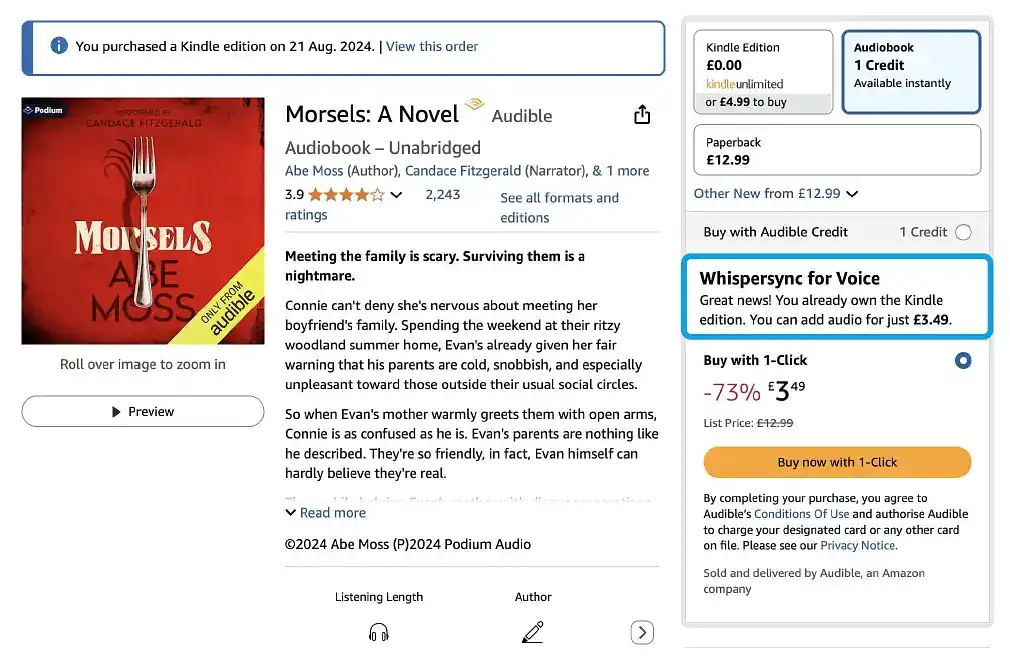
Many savvy audiobook listeners know about the Whispersync discount and actively look for opportunities to use it. I personally buy many of my audiobooks this way — grabbing the ebook when it's on sale, then adding the audiobook at the discounted Whispersync price.
As an author, this is how you can leverage Whispersync:
- Run a price promotion on your ebook (e.g. dropping it to $0.99)
- Check what the Whispersync discount would be for someone who owns the ebook
- In all your promotional materials, highlight both prices: "Get the ebook for $0.99 AND add the audiobook for just $3.99 more!"
This bundled approach makes your promotion much more attractive to different kinds of readers and listeners.
Note that Amazon typically enables Whispersync if the audiobook matches the ebook text by 96% or more. So make sure your audiobook narration closely follows the ebook text.
Also, while direct ACX uploads may enable quicker Whispersync eligibility, books distributed through aggregators like Author's Republic can still qualify — it just might take a bit longer.
Let's now talk about directly discounting your audiobook.
3. Run a price promotion
Price promotions have long been effective for ebooks, but they're still relatively new in the audiobook world. This means they can be particularly powerful because there's less competition.
Audiobook discounts are still new and exciting
First, keep in mind that you can only set your audiobook’s price on retailers that allow price control (basically those not owned by Amazon). Even if you choose wide distribution through a platform like Author's Republic, for example, you won’t be able to set your price on Amazon or Audible. They will automatically determine pricing based on your audiobook’s length, regardless.
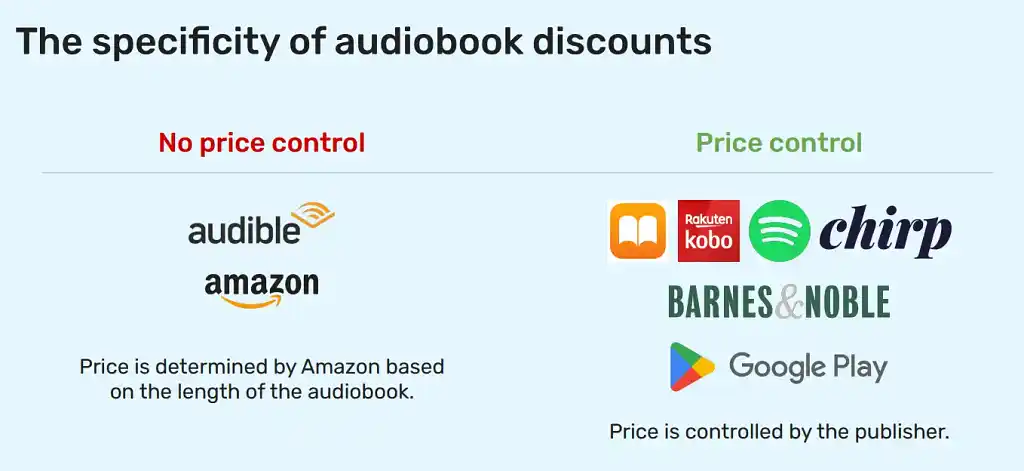
When you do have price control, strategic discounts can dramatically boost visibility and sales. For example, at the time of this writing, there are several audiobooks in the top 10 of the Apple Books US store that aren’t even in the top 300 on Amazon. The reason? They’re heavily discounted on Apple Books.
These discounts work because traditional publishers still rarely discount audiobooks, creating an opportunity for indie authors willing to be more flexible with pricing. But one platform stands out when it comes to offering discounts.
Chirp is the best platform for audiobook deals
Chirp, owned by BookBub, is the premier platform for promoting audiobook deals. It works similarly to BookBub for ebooks, sending newsletters to subscribers featuring discounted audiobooks.
To get a Chirp deal:
- Your audiobook must be available on Chirp
- You need to set a deal price between $0.99 and $5.99 for a limited time
- The deal price must be lower than your regular price
- You must maintain the discount for the month-long promotion period
Mind you, meeting these minimum requirements does not guarantee that you'll get a Chirp deal. You’ll also need an impeccable product page, and probably some reviews under your belt.
Finally, plan to submit your deal request 2-6 weeks in advance of your desired promotion date.
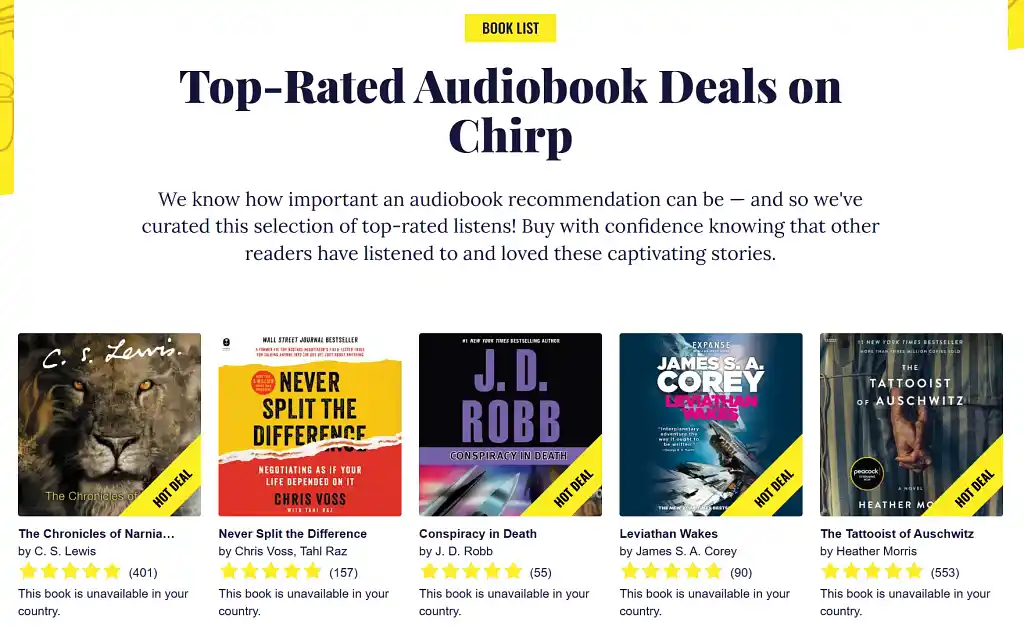
Unlike a BookBub Featured Deal, sales through Chirp happen on their own retail platform rather than on others like Audible or Apple Books. While this means you don't get the same organic visibility boost on major retailers, you do reach a dedicated audience of audiobook bargain hunters.
Chirp deals do have a cost: you pay an additional 10% royalty to Chirp during the promotion period.
Remember that even if you don't make a profit directly from the promotion, the increased visibility and new listeners can pay dividends in the long run.
Now onto the next powerful strategy: bundles.
4. Create an audiobook bundle
Audiobook bundles combine multiple books in a series into one audiobook product (sometimes worth 50+ hours of recordings!) They are a particularly effective marketing strategy for many reasons.
They suit well Audible’s credit-based subscription
The primary reason bundles are so powerful is Audible's credit-based subscription model. Subscribers pay a fixed monthly fee for one credit, which they can redeem for any audiobook regardless of length or price.
This creates a strong incentive for listeners to maximize their value per credit by selecting longer audiobooks or bundles. When faced with using one credit for a single 10-hour book versus using it for a 30+ hour bundle of three books, many subscribers will choose the latter.
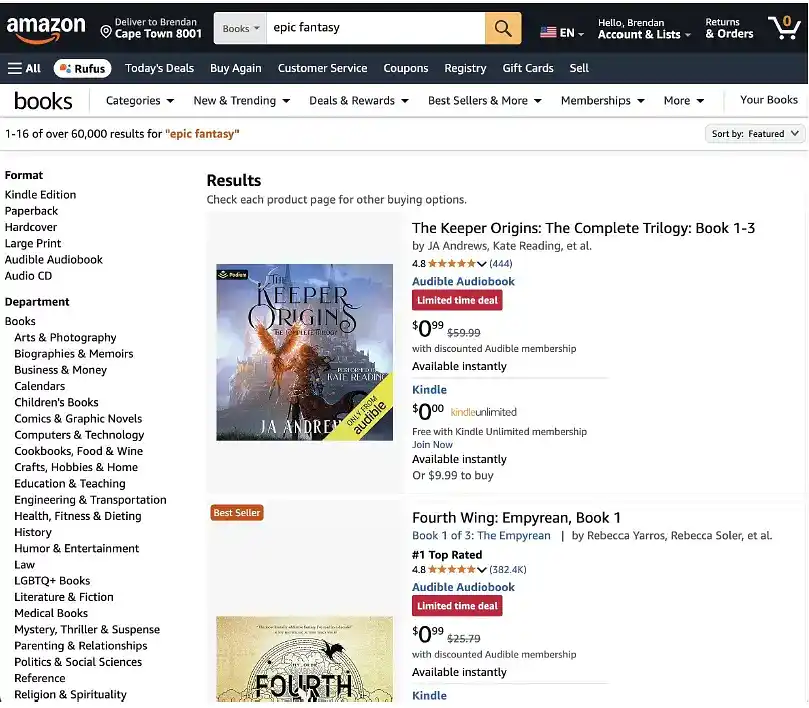
This "more for your money" proposition is compelling not just on Audible but also on other subscription services like Kobo Plus and Everand (formerly Scribd).
Structure and price your bundles for maximum appeal
To make the most out of bundles, follow these simple tips:
- Focus on the first few books in a series (e.g. books 1-3)
- Emphasize the total listening hours in your marketing
- If setting your own price (on wide platforms), create a significant discount compared to buying the books individually.
- Consider creating a unique, attractive cover that clearly indicates it's a bundle
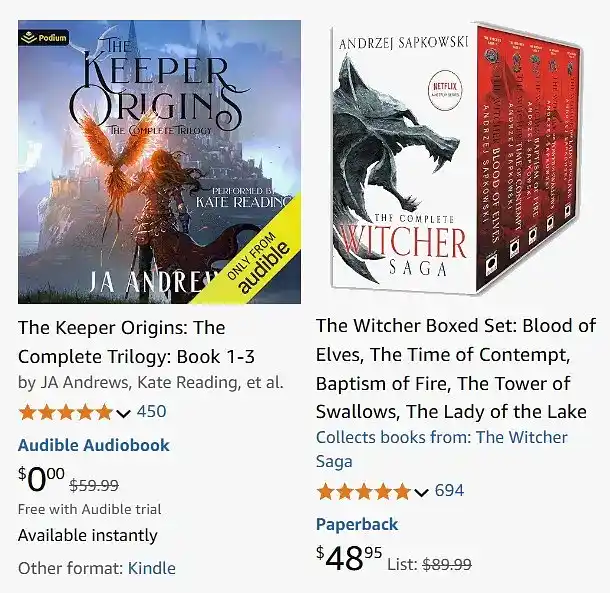
Of course, just creating a bundle (and even discounting it) won’t magically bring readers to it. For that, you’ll need to promote it (e.g. through Chirp), or advertise it…
5. Advertise your audiobook effectively
While Amazon Ads is usually my favorite platform for book marketing (I’ve even written a book on the subject), you can’t advertise audiobooks through it yet.
Instead, I recommend focusing your audiobook advertising on Meta (Facebook/Instagram) or BookBub as they offer the best options for specifically targeting audiobook listeners.
I’ve discussed strategies for both in this Facebook Ads for Authors course and BookBub for Authors blogpost. But here are some quick tips to keep in mind:
Meta advertising tips
When creating Meta ads for audiobooks:
- Target interests like "audiobook," "Audible," and "Spotify" to reach likely listeners
- Signal audio format clearly in your creative (use retail logos, earphones, square cover art)
- Explicitly mention "audiobook" in your ad text
- For discounted audiobooks, show price comparisons
- For bundles, highlight total listening hours (e.g. "Over 20 hours of thrilling storytelling!")
- Consider using short audio samples in video ads (keep under 30 seconds)
BookBub advertising tips
BookBub's advertising platform is unique in allowing you to specifically target audiobook listeners. When you target audiobook listeners only, your ads will appear at the bottom of Chirp newsletters.
For effective BookBub ads:
- Test different author targets one at a time to find which audience responds best
- Use compelling images with strong color contrast
- Clearly display any discounts with "before/after" pricing
- For bundles, make it obvious that multiple books are included
- Keep your messaging simple and focused on value
The most successful BookBub audiobook ads typically feature either significant discounts or bundle offers — or ideally, both.

Measure the ads performance against your baseline
So far, the most reliable way to measure the impact of your ads is to compare your sales to a baseline:
- Establish a baseline of your typical daily sales before advertising
- Monitor your sales and rank changes after running ads
- Compare the difference to determine how many additional sales your ads are generating
When testing different ad creatives or audiences, do so one at a time so you can clearly attribute any sales increases to specific changes.
You’ll have noticed that the strategies in this post are not independent from one another — rather, they actually work best when compounded. Any ads you run, for example, will convert far better if your audiobook is a bundle, and more so if that bundle is discounted. But the best way to truly supercharge your ads is to send them not to an external retailer (Amazon, Apple, etc.), but to your own store.
6. Build your direct sales strategy
If you've been keeping up with the buzz in recent years, you know direct sales have become a hot topic — and they can be especially powerful for audiobooks.
Selling audiobooks direct comes with several key benefits:
- You keep 100% of the royalties
- You maintain full control over pricing
- You capture readers' email addresses for future marketing
- You can see exactly which ads convert to sales
- You can offer exclusive deals and bundles
Naturally, this is only possible if you’re not exclusive to ACX/Audible.
For example, romance author Jillian Dodd sometimes sells her audiobooks directly. She uses a banner at the top of her website to promote bundle deals during specific weeks ("Get 7 audiobooks for just $9.99 this week only.") That’s the kind of exciting, limited-time offer you can run on your own store.
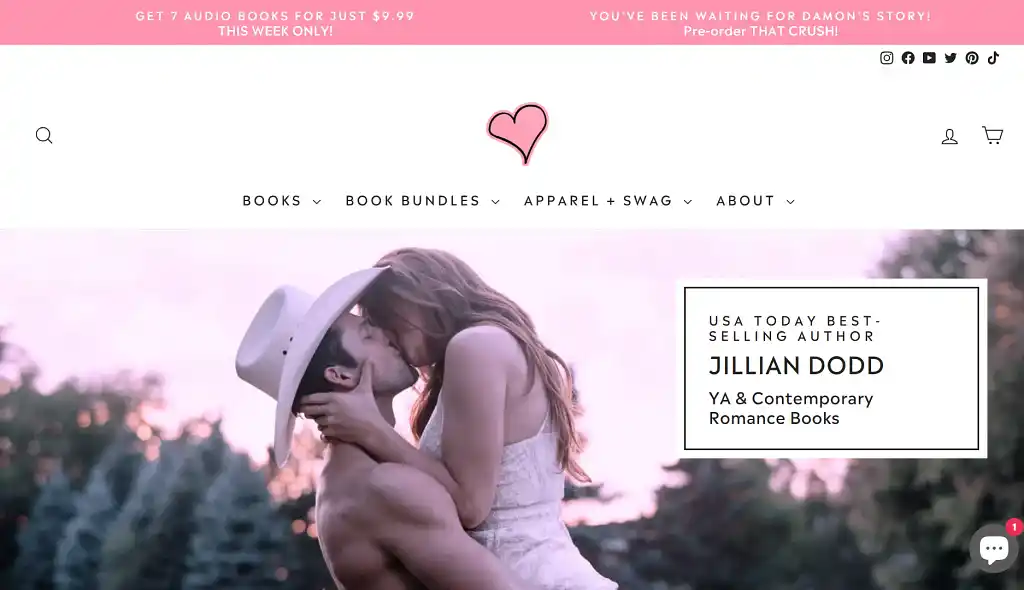
These advantages make direct sales an increasingly important part of any comprehensive audiobook marketing strategy.
Create compelling upsell opportunities
One of the most effective direct sales strategies is creating upsells, for example by offering additional products when someone is already committing to a purchase. For audiobooks, consider:
- Offering a discounted audiobook when someone buys the ebook
- Suggesting a bundle when someone buys a single audiobook in a series
- Creating exclusive packages combining ebook, audiobook, and bonus content
For example, when a reader adds the first book of your series to their cart, you might pitch: "Want the complete trilogy? Get all three audiobooks for $18.99 instead of $29.97!"
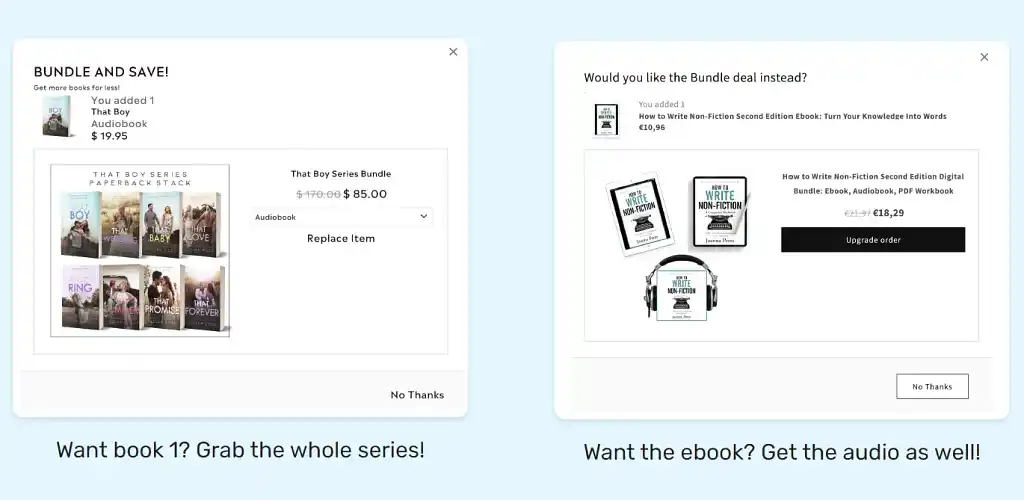
And that’s a wrap.
I only touched on a few strategies you can implement, but if you follow them you’ll set yourself up for success. And if you ever need help with audiobook marketing, consider hiring a book marketer here on Reedsy. They’ll help you understand the unique demands of the format while applying tried-and-true book marketing principles.
Hire an expert
Michal S.
Available to hire
I run Amazon ads for authors who don't have time or headspace to do that by themselves. Dozens of satisfied customers and 150k+ copies sold.
Brian B.
Available to hire
I 've helped hundreds of authors manage their Amazon and BookBub Ads campaigns
Kate L.
Available to hire
10 yrs marketing experience in consulting, launching, and promoting books. Specialized in sci-fi, fantasy, gamelit/litrpg, spec fic, LGBTQ+


